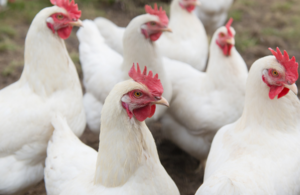Avian Influenza – UK declared free from bird flu but Chief Vet urges ongoing vigilance
The UK has been declared officially free from Avian Influenza (bird flu) following a major outbreak of the disease last winter

Several white chickens walking outside
The UK’s Chief Veterinary Officer, Christine Middlemiss, declared today that international standards have been met to declare the country free from bird flu. However, she also reiterated calls for all poultry keepers to remain vigilant for signs of the disease as we move into this coming winter.
Highly pathogenic avian influenza continues to circulate in both wild and captive birds in Europe and as winter approaches the risk of migratory wild birds flying to the UK over the colder months will mean that the risks for domestic poultry are likely to rise.
Between November 2020 and March 2021, 26 cases of Avian Influenza were confirmed in kept poultry and wild birds in the UK. In all cases, movement restrictions were put in place to limit the spread of disease and carried out thorough investigations into the source and possible spread of infection.
The Government also introduced UK-wide measures to protect poultry from infection from wild birds, including a requirement to temporarily house birds and a ban on bird gatherings.
The UK Chief Veterinary Officer Christine Middlemiss said:
The last year has been very challenging for all those who keep poultry and captive birds, and I would like to thank everyone for their efforts in helping us contain the disease. This is an important milestone that will help our efforts to re-open export markets.
While we are now free of bird flu in this country there is a constant risk of the disease returning through wild birds and this is likely to increase as winter approaches, temperatures fall, and more migratory birds start arriving in the UK.
Poultry and captive bird keepers should maintain good biosecurity practises, such as cleaning footwear, feeding birds indoors, and minimising contact with wild birds. Building these simple actions into routines now will go a long way to limiting the risk of future outbreaks.
Declaring the UK free from Avian Influenza means trade discussions on UK poultry and poultry products can restart with existing and potential new trading partners.
Advice to bird keepers
Simple measures can help to keep flocks disease free. All keepers – whether they run a large commercial farm or keep just a few pet chickens in their back garden – can take these simple steps to reduce the risk of disease before the migration of wild birds begins again this winter:
- Keep the area where birds live clean and tidy, control rats and mice and regularly, disinfect any hard surfaces. Clean footwear before and after visits.
- Keep chickens and turkeys completely separate from ducks and geese.
- Place birds’ food and water in fully enclosed areas that are protected from wild birds and remove any spilled feed regularly.
- Put fencing around outdoor areas where birds are allowed and limit their access to ponds or areas visited by wild waterfowl.
- In Great Britain, stay alert by signing up online to a free service to receive text or email alerts on any outbreaks of bird flu in the UK.
The Government carries out ongoing surveillance in poultry and wild birds and publishes regular disease updates for industry and back-yard keepers. Further information on biosecurity measures all bird keepers can take to keep their birds safe can be found here.
Further Information:
- Under World Organisation for Animal Health (OIE) rules, 28 days must elapse from the application of measures to prevent the spread of disease or completion of final cleansing and disinfection of the last infected premises before a country can be declared disease-free. The final cleansing and disinfection on the last affected infected premises was completed on Thursday 5 August 2021.